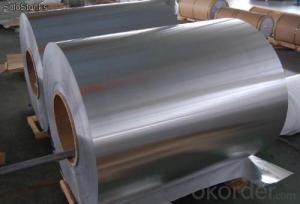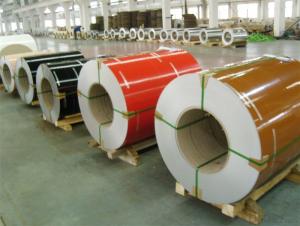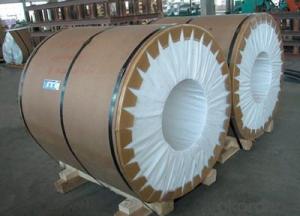Roll of Aluminum 3003 H14 /1100 H14
- Loading Port:
- Shanghai
- Payment Terms:
- TT OR LC
- Min Order Qty:
- 5 m.t.
- Supply Capability:
- 100000 m.t./month
OKorder Service Pledge
OKorder Financial Service
You Might Also Like
1.Structure of Roll of Aluminum 3003 H14 /1100 H14
Roll of Aluminum 3003 H14 /1100 H14 is designed for many field such as electronics, instruments, lighting decoration, packing industry, and house decoration, curtain wall, honeycomb-core panel, sandwich panel, aluminum composite panel, aluminum composite pipe etc.. Roll of Aluminum 3003 H14 /1100 H14 is hard and everlasting under the blazing sun. You can choose the alloys as your habitation and we will do our best to meet your requests.
2.Main Features of the Roll of Aluminum 3003 H14 /1100 H14:
• Smooth surface
• High manufacturing accuracy
• High strength of extension and yield
• Well packaged
• No marks, no scratch, no excessive oil
3. Roll of Aluminum 3003 H14 /1100 H14
Alloy: 1050, 1060, 1070, 1100, 3003, 3004, 3005, 3105, 5052, 5083, 5754, 8011, 8006
Temper: H14, H16, H18, H22, H24, H26, H32, O/F
Thickness: 0.2mm-100mm
Width: 30mm-1700mm
4. Production of Roll of Aluminum 3003 H14 /1100 H14
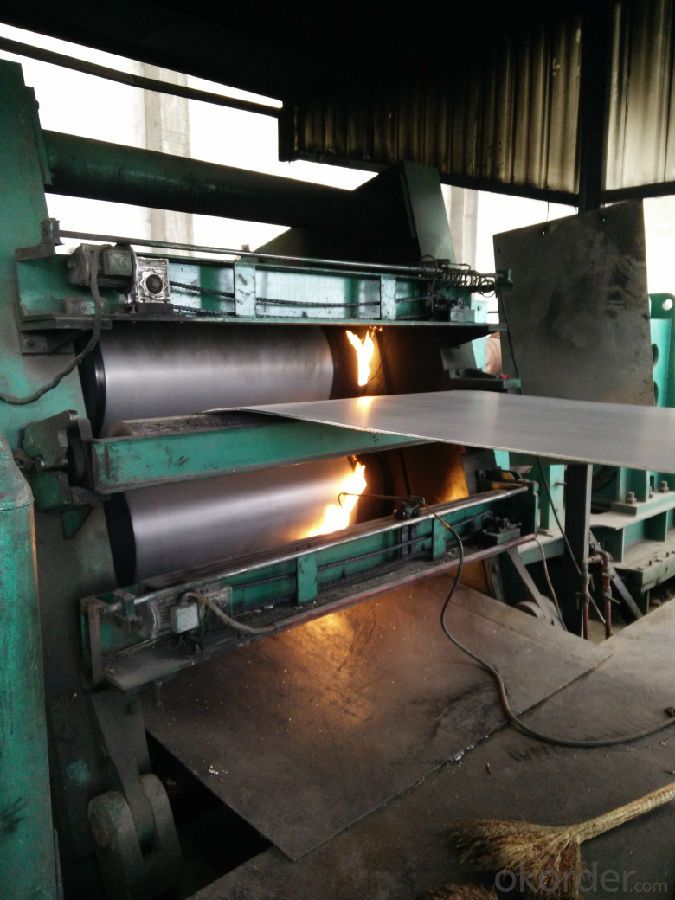
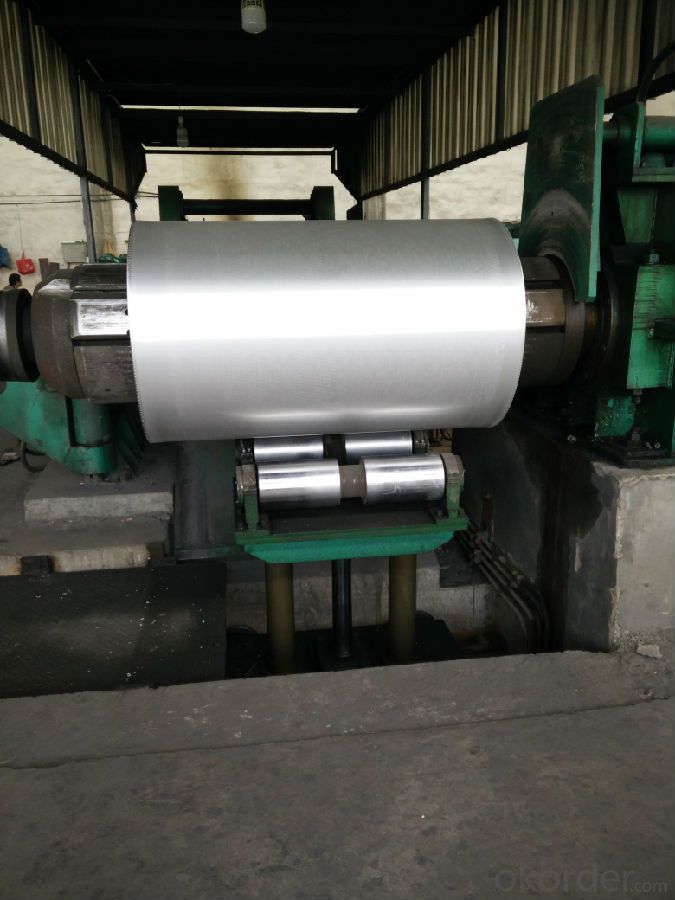
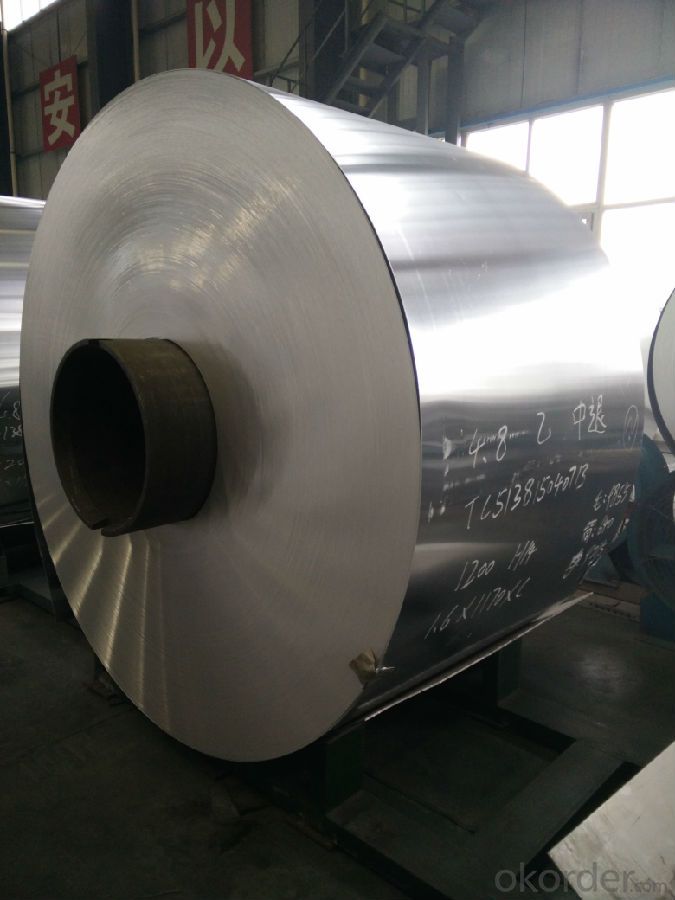
5.FAQ
We have organized several common questions for our clients,may help you sincerely:
① How about your company?
A world class manufacturer & supplier of aluminum coil and alloy blanks. Aluminum production base is comprised of 18 aluminum annealers, 10 coil and foil mills, 4 continuous production lines, 2 hot rolling production line and 3 prepainted lines.
Export 5000 tons per month to Asia, America and Middle East. Always do the best for our clients.
②Can you guarantee the quality of the products?
We are responsible for the quality of materials to get a long-term cooperation with clients in a reasonable period of time and we are glad to arrange and coordinate any third party inspection for you.
③What is the delivery time after purchase?
35 day after receiving client’s deposit or correct LC
- Q:hey, my dad and i are working on painting our front door and the current piece of aluminum in front of it wont go with the new color. it doesnt look like it can be changed out so we are wondering, other than spray paint, what can you put on aluminum to make it turn permanently black. my dad mentioned gun blue, but that only works on steel. thanks
- Dad is on the right track....maybe. There are blackeners for aluminum you can get from gunshops. Used to touch up scratched or worn black anodized finish on aluminum gun parts. Never used it in large areas. Best regards
- Q:My school has lunched catered in daily because it cuts down on staff in the kitchen. The food is delivered in individual aluminum containers for each student. In doing so, the school uses 99,000 aluminum trays in one school year, all of which get thrown away. I'm trying to find an alternative such as biodegradable food containers. Does anyone have any ideas? The container has to be able to withstand the heat of an oven.
- Why not keep using the aluminum? It's 100 percent recyclable! That's even better than having something in a landfull bio-degrading over 10 years!
- Q:How are aluminum coils installed in various applications?
- Aluminum coils are installed in various applications using different methods depending on specific requirements and the nature of the application. Here are a few commonly used methods for aluminum coil installation: 1. HVAC Systems: Aluminum coils are commonly used for heat transfer in HVAC systems. They are typically installed inside air handling or condensing units. Installation involves securing the coils, connecting them to refrigerant lines, and ensuring proper insulation and sealing to prevent leaks. 2. Refrigeration: Aluminum coils are used for heat transfer and cooling in refrigeration systems. They are usually installed within evaporator or condenser units. The installation process includes securely mounting the coils, connecting them to refrigerant lines, and ensuring proper insulation and sealing. 3. Heat Exchangers: Aluminum coils are widely used in heat exchangers for various industrial applications. They are installed within shell and tube or plate and frame heat exchanger units. Installation involves positioning the coils, connecting them to piping and fittings, and ensuring proper alignment and sealing. 4. Automotive Radiators: Aluminum coils are extensively used in automotive radiators for efficient heat dissipation. Installation involves mounting the coils within the radiator assembly, connecting them to coolant lines, and ensuring proper alignment and sealing to prevent leakage. 5. Electrical Transformers: Aluminum coils are used for efficient power transmission and electrical insulation in electrical transformers. Installation involves winding the coils around the transformer core, connecting them to terminals, and ensuring proper insulation and grounding. In all these applications, it is essential to adhere to industry standards and guidelines to achieve proper aluminum coil installation. This includes considering factors such as structural support, alignment, connection integrity, insulation, and sealing to ensure optimal performance and longevity.
- Q:What are the different color options for pre-painted aluminum coils?
- Pre-painted aluminum coils offer a multitude of color possibilities. The choices encompass solid colors like white, black, blue, red, green, yellow, and gray, among others. Moreover, there are metallic finishes, such as silver, gold, bronze, and copper, which create a captivating shimmer. Pastel shades, vibrant hues, and earth tones are also favored options. It is worth noting that the specific color range might differ depending on the manufacturer or supplier. Nevertheless, the overall assortment is extensive, ensuring that diverse design preferences and requirements are well accommodated.
- Q:What is the typical coil width for aluminum coils?
- The specific application and industry determine the typical coil width for aluminum coils. Generally, it can range from a few inches to several feet. In the construction, automotive, and packaging industries, common coil widths typically range from 12 to 72 inches. These widths are chosen based on manufacturing process requirements, final product dimensions, and coil processing equipment. It is important to mention that customer needs and the aluminum coil manufacturer's production capabilities may lead to customized coil widths.
- Q:Are aluminum coils resistant to moisture?
- Indeed, moisture poses no threat to aluminum coils. Being inherently resistant to corrosion, aluminum possesses an innate capability to combat the detrimental effects of moisture and other environmental elements. Consequently, it becomes an exceptional option for endeavors where moisture resistance holds paramount importance, including HVAC systems, refrigeration units, and outdoor equipment. Furthermore, aluminum can be fortified with an assortment of protective coatings and treatments to augment its moisture resistance and prolong its lifespan. In summary, the durability and moisture-withstanding capacity of aluminum coils render them a dependable choice across diverse industries.
- Q:Are aluminum coils suitable for food storage containers?
- Aluminum coils are indeed appropriate for food storage containers. This material is highly favored for such containers because of its many beneficial qualities. To begin with, aluminum is lightweight, which makes it easy to handle and transport. Moreover, it possesses excellent thermal conductivity, allowing for quick heating or cooling, making it perfect for storing both hot and cold food. Additionally, aluminum is resistant to corrosion and does not react with acidic or alkaline foods, ensuring that the taste and quality of the food remain unaffected. Furthermore, aluminum is an environmentally friendly choice as it is sustainable and can be recycled. However, it is worth noting that aluminum containers should be coated with a food-grade lining to prevent any potential interaction between the metal and the food, particularly with acidic foods. In conclusion, aluminum coils are a suitable option for food storage containers due to their lightweight nature, thermal conductivity, resistance to corrosion, and recyclability.
- Q:How do aluminum coils contribute to indoor air quality?
- Aluminum coils used in heating, ventilation, and air conditioning (HVAC) systems do not directly contribute to indoor air quality. However, they play a crucial role in maintaining indoor air quality by helping to cool and dehumidify the air. By efficiently transferring heat and moisture, aluminum coils aid in controlling temperature and humidity levels, preventing the growth of mold, mildew, and other harmful microorganisms that can negatively impact indoor air quality.
- Q:What do you think of the stainless steel with copper and aluminum core cookware? And what's a good brand?
- You can also get stuff with a sandwich of copper / aluminum on the bottom. they aren't nearly as good as true All-Clad, but they are way cheaper and still make nice pots and pans.
- Q:How do aluminum coils contribute to reduced maintenance costs?
- Aluminum coils contribute to reduced maintenance costs primarily due to their exceptional durability and resistance to corrosion. Unlike other metals, such as copper, aluminum coils are specifically designed to withstand harsh environmental conditions, including exposure to moisture, salt, and chemicals. This resistance to corrosion ensures that the coils remain intact and functional for extended periods, minimizing the need for frequent repairs or replacement. Additionally, aluminum coils are lightweight, making them easier to handle and install, which reduces labor costs associated with maintenance activities. Furthermore, their high thermal conductivity allows for efficient heat transfer, resulting in increased energy efficiency and lower utility bills. Overall, the use of aluminum coils in HVAC systems helps to reduce maintenance expenses and prolong the lifespan of the equipment, making them a cost-effective choice for both residential and commercial applications.
1. Manufacturer Overview |
|
|---|---|
| Location | |
| Year Established | |
| Annual Output Value | |
| Main Markets | |
| Company Certifications | |
2. Manufacturer Certificates |
|
|---|---|
| a) Certification Name | |
| Range | |
| Reference | |
| Validity Period | |
3. Manufacturer Capability |
|
|---|---|
| a)Trade Capacity | |
| Nearest Port | |
| Export Percentage | |
| No.of Employees in Trade Department | |
| Language Spoken: | |
| b)Factory Information | |
| Factory Size: | |
| No. of Production Lines | |
| Contract Manufacturing | |
| Product Price Range | |
Send your message to us
Roll of Aluminum 3003 H14 /1100 H14
- Loading Port:
- Shanghai
- Payment Terms:
- TT OR LC
- Min Order Qty:
- 5 m.t.
- Supply Capability:
- 100000 m.t./month
OKorder Service Pledge
OKorder Financial Service
Similar products
New products
Hot products
Hot Searches
Related keywords

